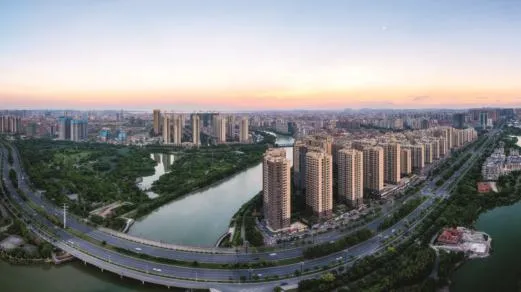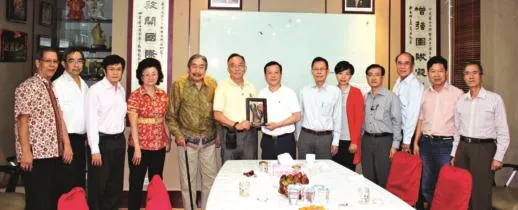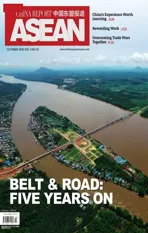BUSINESS VOYAGES
2018-11-05ByWangXiang
By Wang Xiang
As both a witness and player in China’s reform and opening-up, Xu Jincong has seen his business thrive in Southeast Asia across three adventures
Born into a family with overseas connections in the southeastern Chinese coastal city of Jinjiang, Xu Jincong served in the military before becoming a public servant and then starting a venture in the Philippines when China opened its door to the outside world. Xu’s business later expanded to Indonesia and other Southeast Asian countries, and his story epitomizes the advancement of China’s reform and opening-up over the past four decades.
Maiden Business Voyage
Jinjiang, a renowned base for overseas Chinese in Fujian Province, is the ancestral home of some 3 million global citizens of Chinese origin,three times the population of the city itself. At the dawn of China’s economic reform, the city’s per capita arable land was only 130 square meters,which forced numerous locals to venture abroad to seek fortunes.
After retiring from the Army in the 1970s, Xu Jincong spent his days wandering the streets on a bicycle carrying sacks of grain to exchange for daily necessities. Just a few months later, he found a job in a market management committee of the government.

Xu Jincong.
In 1978, the Third Plenary Session of the 11th Central Committee of the Communist Party of China announced the beginning of the reform and opening-up policy, which inspired overseas Chinese to send money back to their families and even return to their hometowns to “bring glory to their ancestors”according to local traditions.However, Jinjiang’s limited arable land gradually led to a growing unemployed population, and thanks to continuous remittance inflow from overseas relatives, many locals accumulated significant savings while many new houses built by Jinjiang natives living abroad were left empty.
Under the guidance of the reform and opening-up policy,the “unoccupied people” began using the “spare money” to found family workshops in their “empty houses,” which became the early forms of Jinjiang’s private sectors.
“Back then, Jinjiang citizens were quite aware of policy changes,” Xu recalled.The city saw a rising tide of entrepreneurship, and establishing a manual workshop became a trend.The majority of the workshops engaged in garment and footwear manufacturing,largely thanks to preferential policies for “three processing and one compensation”enterprises.” Under the policies, foreign partners provided equipment, raw materials and samples and exported the products to international markets while Chinese enterprises offered land, plants and labor. It was then that Xu jumped on the entrepreneurship bandwagon,starting with textile machinery manufacturing.

Century Avenue running through the city of Jijiang, Fujian Province.
With their first buckets of gold earned, Jinjiang merchants began embarking on business expedition to Southeast Asia. Xu Jincong was among them. In 1982,he arrived in the Philippines where he learned printing machine techniques that helped him achieve the first transformation and upgrading of his factory.
With their first buckets of gold earned, Jinjiang merchants began embarking on business expedition to Southeast Asia.Xu Jincong was among them.
“Three Processing & One Compensation”refers to the enterprises that process raw materials, assemble supplied parts and perform processing according to foreign clients’samples or engage in compensation trade.
Successful Return
As the pace of reform and opening-up accelerated, the Law of the People’s Republic of China on Foreign-funded Enterprises was promulgated in 1986, allowing foreign investors to set up enterprises in Chinese territory, recognizing the legitimacy of foreign investment and encouraging the establishment of Sinoforeign joint ventures.
Xu thus mobilized several of his overseas relatives to establish a joint venture with capital introduced from abroad.“I remodeled an unoccupied part of our family’s old house into a plant to produce spinning and printing machine accessories,” Xu revealed.
Xu’s business grew vigorously, and thanks to the government’s further policy support for opening-up, the entrepreneur once again expanded his focus beyond China. In 1990, he made a second journey southward across the border to promote his products at international exhibitions in Southeast Asia,which greatly improved market access for his products.

In the afternoon of September 8,2015, a delegation from the Overseas Chinese Affairs Office of Fujian Provincial People’s Government of China visits Indonesia Jinjiang Association,accompanied by the Association’s Standing Consultant Xu Jincong (second right).
Probably due to an open mind and broader view influenced by their overseas relatives, Jinjiang entrepreneurs had already developed an awareness of brand building as early as the 1990s, as evidenced by the emergence of a number of nationally-famous garment and footwear brands. Though many earlier brands were eventually weeded out from fierce market competition, the branding awareness was passed down,which explains why Jinjiang is reputed to be “China’s Capital of Brands,” home to 42 globally-renowned brands and 15 regional brands.
While many investors began preparing to leave Indonesia, Xu saw the “crisis of others as opportunity.”
A Third Adventure
In 1997, a financial crisis swept across Southeast Asia. As a result, the Indonesian rupiah devalued heavily against the U.S. dollar, from previously IDR1,900 per USD to IDR13,000 per USD, sparking a panic among foreign businesses.While many investors began preparing to leave Indonesia, Xu saw the “crisis of others as opportunity.”He immediately embarked on his third adventure to the Southeast Asian market.Partnering with celebrated local Chinese entrepreneurs and with newly-obtained right to residency in Indonesia, he founded Universe Group and established a company in Hong Kong.
Despite ups and downs over the years, Xu has always remained committed to machinery manufacturing.“Transformation and upgrading are now buzzwords, but when and how to transform and upgrade should be carefully considered against national policy,” he opined.
In 2012, as the strategic decision to “build an ecological civilization” was officially elevated to national policy,Chinese President Xi Jinping emphasized that “lucid waters and lush mountains are invaluable assets” on many occasions. Inspired by this new drive, Xu’s company began researching and developing garbage disposal, and after three years of trial and error,they finally succeeded.The garbage biodegrading technology they developed is now the most advanced in the world, capable of transforming 99 percent of kitchen waste into valuable bio-gas. Its biomass combustion and detonation technology won an Excellent Energy Award from Fujian Province. Boasting more than a hundred domestic and international patents,Xu’s company has achieved a successful transformation and upgrade.
Over the years, Xu’s company has continued unremitting efforts in technological innovation. “We develop a backup technology every two or three years in accordance with national policy,” Xu explained. “State policies and guidance provide direction for every step of our research and innovation.”
